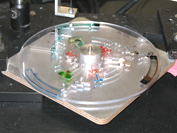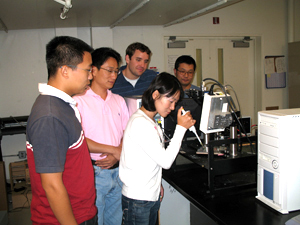UC Irvine Receives $1.5 Million to Develop Handheld Device That Can Identify Microbe-Causing Infections in Patients
Scientists and researchers take part in international research project to advance molecular theranostic technologies
 UC Irvine’s Mechanical and Aerospace Engineering department has received a $1.5 million grant as part of a three-year, $12.6 million international research initiative to develop a new device that will allow the rapid and simple detection of nucleic acids in order to identify infectious microbes in patients. Scientists and researchers will work with advanced molecular theranostic technologies, or more comprehensive diagnostic testing methods that combine both diagnosing the patient’s disease as well as choosing the appropriate therapy.
UC Irvine’s Mechanical and Aerospace Engineering department has received a $1.5 million grant as part of a three-year, $12.6 million international research initiative to develop a new device that will allow the rapid and simple detection of nucleic acids in order to identify infectious microbes in patients. Scientists and researchers will work with advanced molecular theranostic technologies, or more comprehensive diagnostic testing methods that combine both diagnosing the patient’s disease as well as choosing the appropriate therapy.
By detecting nucleic acids, or protein building blocks that act on a cell's nucleus, doctors will be able to quickly test and discover certain infections in their patients, as well as explore new advancements in personalized medication and treatment therapies.
UC Irvine’s research team, headed by Marc Madou, chancellor’s professor of mechanical and aerospace engineering and biomedical engineering, will collaborate with three research institutions from the National Research Council of Canada. The teams, comprised of experts ranging from a variety of technological fields including engineers, physicists, chemists, molecular biologists, and infectious disease specialists, will work together on the following modular platforms – microarray platforms for multi-parametric detection, new fluorescent polymeric biosensor platforms, and microfluidic platforms on compact discs (CDs).
The research groups will merge these technologies to produce nucleic acid detection platforms and create an efficient handheld detector.
“UC Irvine is part of a multidisciplinary research effort to create and develop a disposable, handheld instrument that will integrate three modular platforms into one complete micro total analysis (uTAS) system,” Madou said. “Our ultimate goal is to provide doctors with a new tool that will help them identify and administer quicker diagnoses, potentially speeding-up the recovery process for their patients.”
Constructed from standard CD plastic injection molding and simple surface treatments, the device will be easily manufactured in bulk, and will use automated technology rather than current labor intensive techniques needed for fast DNA analysis. Further, the device will be more affordable due to the use of economical, disposable materials.
“In order to effectively help patients identify infectious diseases and treat them with the correct medicine, physicians need test results within a one-hour period. The current technology is expensive and slow, requiring highly skilled personnel to administer. It makes it more difficult for doctors to utilize on a consistent basis,” Madou added.
Two pre-clinical trials are scheduled; one will test for the detection of respiratory viruses, and the other for the detection of microbes responsible for certain bloodstream infections.
The project, led by Dr. Michel G. Bergeron, director of the Infectious Diseases Research Centre at L’Université Laval in Québec, is primarily sponsored by Genome Canada/Genome Québec, which provides funds and resources for the exploration and advancement of genomics and proteomics, or the study of genes and proteins.
Professor Madou's UC Irvine Research Team

